|
115 Snargate Street
Dover
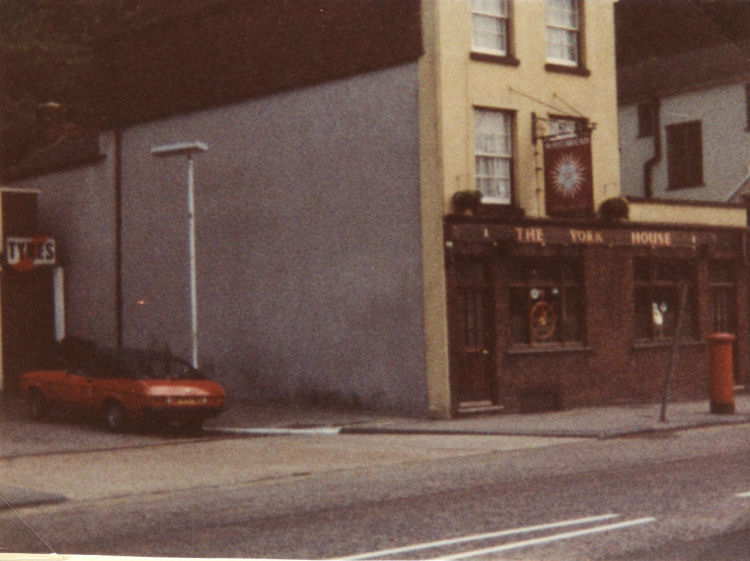 |
York House circa 1980, photo by Barry Smith. |
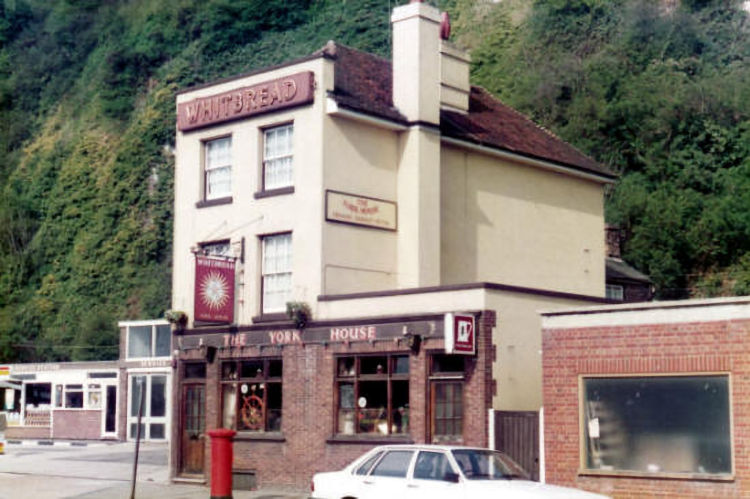
Above photo, 1983 by Eddie Chard. |
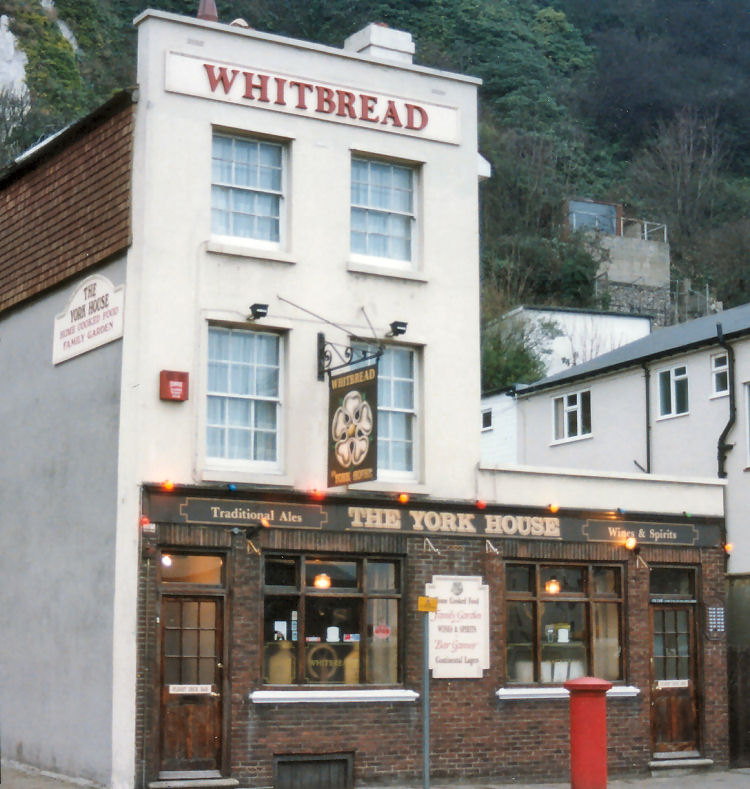
Above photo pre 1989, kindly sent by Michael Lock. |
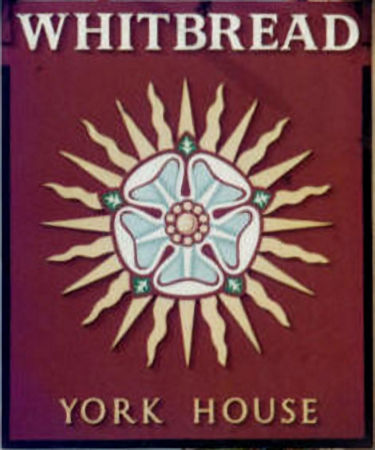
Above sign 1983. |

Picture kindly sent by Paul Wells. The date of the pub is unknown but
it is believed to be the "York House" before the buildings to the left
of the picture were demolished. |
Present in 1858 and perhaps in its favour not often hitting the
headlines.
I have also found reference to the "York House," Dover being mentioned in
a Kentish Gazette paper of 1793. (Click
here) which would indicate that this house was operating in that year.
However, this may be in reference to the "York
Hotel." However, the owners names are mentioned as being Rutley, which
are indeed the owners of the "York Hotel," so
that original reference is indeed incorrect.
|
Kentish Gazette, Tuesday 7 October 1862.
Assaults on the Police.
James friend, a respectable looking young man, living at Ladywell, was
mulcted in a penalty of 20s. and 6s. costs, or a fortnight in gaol for
damaging a policeman's face on being removed from the "York House,"
Snargate Street, where he had been breaking the landlord's pots and
glasses.
The money was paid.
|
|
From the Dover Express and East Kent Intelligencer,
20 January, 1871. Price 1d.
DRUNK AND DISORDERLY
Samuel Frost, a mariner, was charged with causing an obstruction of
the footway, in Snargate Street.
Police-constable Henry Nixon said he was on duty in Snargate Street
on Saturday night, a little before twelve o'clock, when he saw the
prisoner on the footway opposite "York House." he was very drunk and his
dress was in a disorderly state. Witness remonstrated with him; but he
declined to adjust his dress, and witness therefore took him to the
police-station. Though he was the worse for liquor, he was not drunk as
to be ignorant of what he was about.
The prisoner said he had no recollection whatever of what had
occurred.
In reply to the Magistrates he stated that he belonged to Jersey, and
was here on look-out for a ship.
The police-constable said he had had a great deal of trouble with the
prisoner for two or three nights previous to Saturday, having found him
at various parts of his beat more or less intoxicated.
The Magistrates fined the prisoner 10s. 6d., and 6s. costs; in
default of payment he was sent to the House of Correction for fourteen
days.
|
|
From the Dover Express and East Kent Intelligencer,
1 January, 1875. Price 1d.
A BRACE OF INCAPABLES
John Watkins who had been found in a deplorable condition in Queen
Streeton Boxing Day, and Henry Kenway who was found lying with his face
in the bar at the "York House" on the same day, were brought up charged
with drunkenness. They were both cautioned and discharged.
|
|
From the Dover Express and East Kent News, Friday 18 January, 1907. Price 1d.
TODAY'S POLICE COURT
At the Dover Police Court this morning, there were neither any prisoners
not summonses to be dealt with. Permission was given to the “York House,” Snargate
Street, to sell at the Catholic ball to be held at the Drill Hall,
Northampton Street, on January 23rd in aid of the Catholic Mission,
Snargate Street.
|
|
From the Dover Express and East Kent News, Friday 3 December, 1909.
PUBLIC HOUSE THEFT
SOLDIER TAKES SAILORS CHANGE
At the Dover Police Court on Saturday, before Messrs. J. L. Bradley
and H.F. Edwin, Albert John Mayman, a private in the Royal Army Medical
Corps. was charges on suspicion of stealing from the counter of the
saloon bar of the "York Houe Inn," Snargate Street, 9/7, the money of
Mrs. Lilian Lewis, wife of the landlord; he was further charged, on
suspicion, with stealing 10/-, the money of Able Seaman W. G. Neville,
on H.M.S. "Amason."
Mrs. Lewis said that at 5 minutes to 11 on Friday evening, she saw
the prisoner pick up 9/7 in change from the counter of the saloon bar,
and rush out of the public house with it. The money had been put on the
counter by the barmaid, who thought a sailor in the bar had put down a
half sovereign to pay for 5d. worth of drink. On looking in the till the
half sovereign could not be found, and it was concluded that the sailor
had put down sixpence. The sailor said he would not have the money as he
did not wish to get the barmaid into trouble, and the prisoner then ran
off with it. Witness called the sailor's attention to the fact, and he,
Mr. Lewis, and other men went after the prisoner and caught him, and as
he would not hand over the money, Mr. Lewis gave him into custody. She
had looked in the till, and seen that there was no gold in it.
Esther Robinson, barmaid at the "York House" stated that she did not
see the prisoner enter the bar, but she saw him there just before 11
o'clock. A sailor asked for 5d. worth of drink, and to his friend,
another sailor, he remarked that 4d. was not enough, and he would have
to change half a sovereign. She put down 9/7 in front of him as change,
and then looked in the till to see if the gold was all right, and found
no gold there. She told the sailor he gave her sixpence and not half a
sovereign, and he said he must have made a mistake, and asked witness to
take the change back. An argument ensued, and while it was going on the
prisoner picked up the money and ran out with it. She followed the
prisoner and tried to induce him to give up the money, but he said he
had not got it. The prisoner was drunk.
Walter James Neville, A.B. on H.M.S. "Amazon," said he went to the
"York House" with a man named Stuart from his ship at 5 minutes to 11.
After calling for the drinks he found that he had only 4d. in coppers,
so he put half a sovereign on the counter. The barmaid put the drinks on
the counter before she took up the money, and afterwards asked if he was
sure he put down gold, and he said he was. When he left the ship he had
half a sovereign and other money, including a sixpence, and he
afterwards thought he might have given the gold to the conductor of a
tram on which he rode in mistake for 6d. He told the barmaid this, and
said that rather than get her into trouble he would not take the money.
While they were speaking the prisoner said, "That's your money, Jack;
pick it up," and prisoner then took it from the counter and ran out. The
prisoner was under the influence of drink.
Henry Thomas Stuart, A.B. said he saw the barmaid put the change on
the counter, and saw the prisoner go out with it while an argument was
in progress. Witness followed, and the prisoner offered him some money
he had in his hand "to settle it." He told the prisoner that it was not
his, and he had better take it to Neville, ad he then pushed the
prisoner and he fell on the pavement.
Police-sergeant Fox said he saw the prisoner and two sailors leave
the "York House," followed by the landlord, and from what he was told by
the landlady and the barmaid, he asked the prisoner whether he had taken
the money from the counter which did not belong to him. In reply to
further questions the prisoner said he had 1/- in silver when he went to
the public house, and he took 9/8 in silver and bronze from his trouser
pocket; he said that was all the money he had on him, but in the reserve
room at the police station he gave the inspector 8/4½
from his hip pocket and a half sovereign from his belt under his
waistcoat. When the first charge was read to him he said, "I am
innocent"; he made no reply to he second charge.
The prisoner pleaded not guilty to stealing the
10/-. He said he knew nothing of the 9/7, as he was drunk, and he
remembered nothing of the matter. If he took it he was willing to
apologise to the sailor and to the landlord, and to return the money. He
went out the previous evening with three half sovereigns and 10/- in
silver, and after paying out several accounts he should have about 12s.
left.
Police-sergeant Fox said both the two witnesses
and the prisoner were more or less under the influence of drink on the
previous evening.
The chairman said it was a very serious and sad
case. His officer gave him a good character .He thought he had done
wrong in pleading not guilty, as on his own confession he had more money
than he could account for, but the Bench did not propose to send him to
prison; he would be fined 40s. and have to return the 10s. and 9/7. He
asked the landlord to be careful in serving people, and said the bench
were glad such games were not of frequent occurrence in Dover; the
sailors and soldiers in the town were generally very well behaved.
On Monday, Mayman appeared and stated that he
wished to appeal against the Magistrates' conviction.
The Chairman: But you pleaded guilty.
Mayman: I was in a dazed condition and did not
know what I was doing.
Mayman was advised that he could not appeal.
|
|
From "Inns of Kent"; Whitbread & Co. Ltd.; 1948.
To say that Dover has been hard hit is something of an understatement;
devastated is the only word. This most famous and oldest of English
ports first of the Cinque Ports and as old as London, gateway to France
with all its ancient and modern implications has indeed been laid low.
Its inns have suffered too, in proportion to the whole; consequently the
smiling double front of The "York House" provides some relief. The "York House" just beams in the sun on what is left of Dover's front; wars and
rumours of wars are forgotten, and only the future is a concern. For the
rest, The "Prince Imperial" on the quayside is still there and The
"Duchess
of Kent" has survived; both flourish, as well they deserve to. |
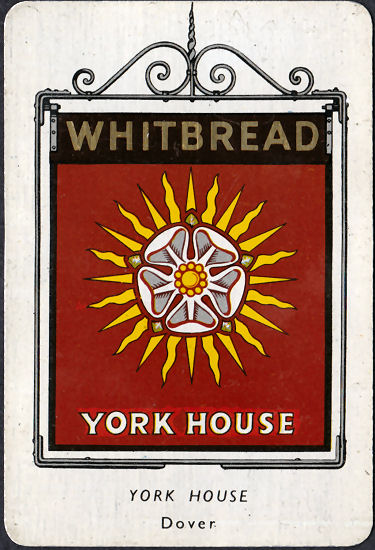
Above aluminium card issued June 1951. Sign series 3 number 47. |
War damage was made good in December 1945 and ten years later, the
derelict property next door was incorporated. Many structural alterations
necessary of course which provided a total modernisation.
|
Dover Express 6th May 1949.
Town, Port & Garrison.
Dover Magistrates on Friday granted an occasional licence to Mr. E.
Branson of "York House," Snargate Street to sell at the Town Hall
tonight from 8.30 p.m. to 12.30 a.m. on the occasion of the annual
dinner and dance of the Rotary Club Inner Wheel.
|
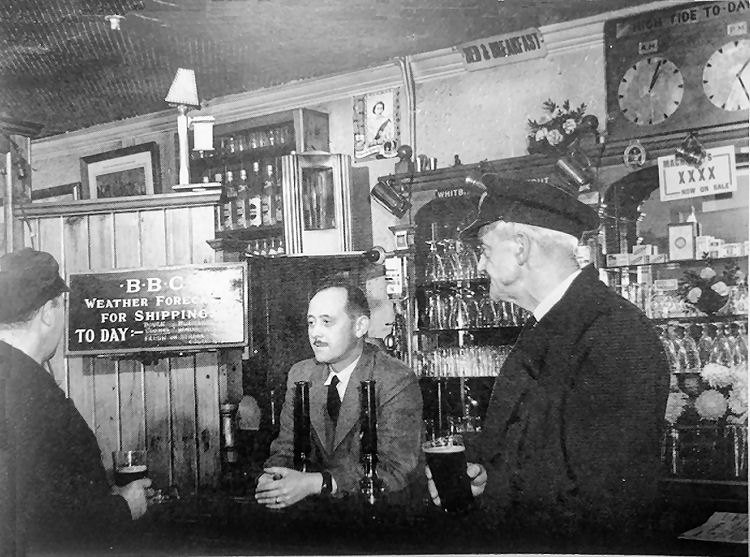
Above photo, 1952 showing licensee Edward Branson. Kindly sent by Rory Kehoe. |
I am informed that licensee Edward Branson always maintained tide tables
in his pub and broadcast the BBC shipping forecast, so that his seafaring
regulars were up-to-date with weather conditions in the Channel.
A Mackeson house which joined the Whitbread group.
Now called the "Flagship". (2007).
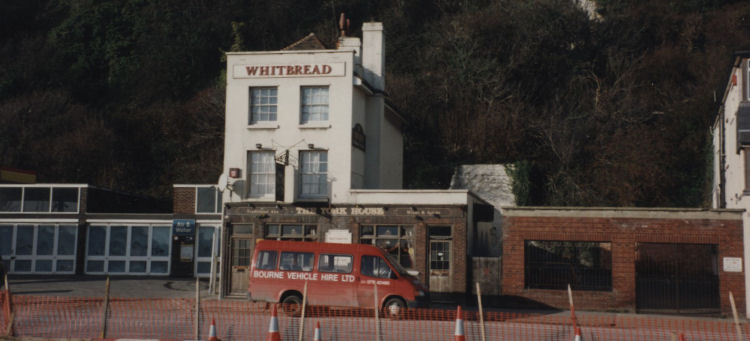
York House in 1993. By kind permission of Dover Library ILL/4534.
|
|
From the Dover Mercury 2 April 1998.
Barman found in woman's clothing.
A police officer has told of the night he went into a public house and
found a barman unconscious - dressed in woman's clothing - and customers
helping themselves to drink.
The York House in Snargate Street could be closed down this weekend if
licensing justices agree to a police request not to renew the licence
following complaints about after hours drinking.
Sgt Phil Wood said he went to the pub just before 4 a.m. on June 15, 1995,
after a police patrol heard loud music and saw lights on.
"I looked through the window and saw a man and a woman at the bar and
several empty glasses," he said. "There was someone unconscious on the
bench."
Inside, the officers found the person in woman's clothing unconscious on the
bench was barman, Ian Prescott, also known as Fluff.
"We couldn't wake him up," said Sgt Wood. "The other people said they had
been helping themselves to the alcohol since Fluff passed out at 11.30 p.m.
They had no idea who the licensee was.
Other officers told of early morning visits they made in June and July 1995,
when they found Mr. Prescott drunk and other people drinking. PC Craig
Thompson said: "In my opinion, he didn't have a clue about running a
licensed premises, or licensing law.
The licensee, Paul Birchenough, was not there. He was interviewed by PC
Thompson on August 2 and said that after hours drinking sessions were a
"reward" for Mr. Prescott for helping out as unpaid barman.
"The alcohol was free to Mr. Prescott and his friends, and came out of my
profits," he said. "He is under strict instructions not to sell any alcohol
over the bar after 11 p.m.
The justices were told Mr. Prescott has since been sacked.
On December 8, 1995, officers attended just after midnight and found eight
people playing cards with money on the table and glasses in front of some of
them. There were three people at the bar. Mr. Birchenough said they were his
daughters friends, and claimed some were drinking tea.
Justices were shown a video tape of one of the police raids, as well as a
Spice Girls video, seized from the pub, which was said to be counterfeit.
Traffic wardens told of abuse they had been subjected to in Snargate Street,
particularly from customers in the "York House."
The hearing was adjourned.
|
|
From the Dover Mercury 8 April 1998.
"Cleanest" pub is closing down.
A PUBLIC house has been closed down by Dover's licensing justices despite a
claim from the licensee that it was "the cleanest house in town."
An application by licensee Paul Birchenough and William Chambers for
the renewal of the licence for the "York House," in Snargate Street was
refused by the licensing committee.
An immediate application by Pubmaster for a protection order so that a new
licensee could be put in was turned down.
As reported in last week's Dover Mercury, police officers gave evidence of
after-hours drinking sessions at the pub. On one occasion in 1995, they
found the barman, dressed in woman's clothing, unconscious just before 4
a.m. Two customers were helping themselves to drink. Mr. Birchenough said he
had sacked the barman.
Pub not a den of iniquity
The committee was told police had twice gathered evidence to prosecute Mr.
Birchenough for allegedly supplying drinks after hours.
The committee also heard that, on one occasion, 52 cases of duty-free beer
had been found in the cellar. Five counterfeit Spice Girls videos had been
confiscated, and police had found a truncheon behind the bar.
Mr. Birchenough said the beer was for a family Christmas party. His wife had
bought the videos at Ashford market not realising they were counterfeit,
and he had taken the truncheon from a customer.
Asked about "known criminals" who used his pub, Mr. Birchenough said he had
no way of knowing who were criminals and denied it was a base for
bootleggers.
Mr. Birchenough said: "My trade has plummeted as a result of all the police
attention. The pub has been tagged as a den of iniquity, but it's not."
|
|
From the Dover Express 23 April 1998 by Sergio Nardone.
York House opens as tea shop
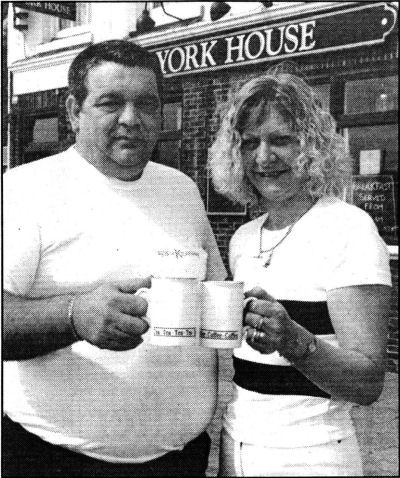
Former landlords sweeten loss by opening tea shop!
CHEERS: Paul and Maureen Birchenough outside their freshly opened tea shop |
A PUB landlord whose licence to sell alcohol has been taken away by magistrates has brewed up a novel way to carry on serving - he's turned his pub into a tea shop.
For the past two years Paul Birchenough, and his wife, Maureen, both 44, have managed the York House, in Snargate Street, Dover.
But earlier this month the town's licensing magistrates decided not to renew its licence after police reports of two incidents of after-hours drinking and claims that bootleggers used it as a meeting place.
Mr Birchenough said: "Those two incidents happened in 1995 when we had a manager to look after the premises for us.
"We immediately replaced him and since we have been here we've never had to call in the police. There's never been any drugs, fighting or under-age drinking."
He also says the bootlegger claim is unfair: "I'm a victim of my position, being so close to the hoverport. It's understandable, people come in for breakfast with their bags of duty frees. I can't ask everyone their trade is
before serving them tea or coffee."
The disillusioned couple say it would be futile appealing against the decision so instead they have turned the pub into a tea shop.
Mr Birchenough said: "We're absolutely gutted our licence wasn't renewed. Pubmaster, the owner, has asked us to stay so day trippers can still come for coffees, teas and breakfasts. We will call it a tea shop not a pub."
The local licensing officer, PC Steve Taylor, said: "At the end of the day the reason the York House licence was withdrawn was down to a lack of management and control of the premises.
"The justices' decision was based on the evidence provided. That's why the licence will not be renewed. As we said in court, Mr Birchenough is not a fit and proper person, under the 1964 Act, to hold a liquor
licence."
|
LICENSEE LIST
ARGAR William 1858-74+
 
CORNWALL William Munday to May/1880

ARGAR Mrs Julia May/1880-82+
 (of the York House, widow)
(of the York House, widow)
WOODWARD Mary A 1891+ (age 50 in 1891 ) )
 ADAMS John Rowe 1898
ADAMS John Rowe 1898
CORTEEL Antoine Edmund 1901-Jan/06
   
MARSHALL Francis George 1905-Mar/08
 (Late of
Hastings) (Late of
Hastings)
LEWIS Albert/Alfred Charles Mar/1908-Aug/13
  
NICE Charles Frederick Aug-Dec/1913+
 (Licensee
of Waltham) (Licensee
of Waltham)
SWAN W H G Dec/1913-Oct/14
 (Of
Knockholt) (Of
Knockholt)
MORRIS Joseph Oct/1914-Apr/22

 
 SHINGLETON Albert William Apr/1922+
SHINGLETON Albert William Apr/1922+

MARTIN E or MURTON 1922 end ?
CHEESEMAN Victor H 1923-Aug/25
 
CRESSWELL William Aug/1925-Apr/26
 (Of
Notting Hill, London) (Of
Notting Hill, London)
MATCHAM William James Apr/1926-Aug/33
   (Of the "Old White Hart," Godalming, Surrey)
(Of the "Old White Hart," Godalming, Surrey)
STURGESS Walter Victor Aug/1933-Dec/36
 (Camberwell, cashier to the General Omnibus Company.)
(Camberwell, cashier to the General Omnibus Company.)
WIGG Mrs Anne Phylis Dec/1936-38+
 ( ( WHIGG) WHIGG)
BRANSON Edward 1948-67 dec'd
   
BRANSON Mrs Joan 1967
ABEX Robert T F M 1972-78 end
 Whitbread Fremlins
Whitbread Fremlins
ELLIS Alan Leslie 1978-84 end

CARD Eric 1984-87
MART Graham John 1991-96
 MISON Sara 1996
MISON Sara 1996
BIRCHENOUGH Paul 1996-98+
Albert Charles Lewis was a musical entertainer from Faversham before
taking on the York House.
The Dover Express reported that Joseph Morris had previously been
employed at Tilmanstone, and was formerly of Folkestone.
 From Melville's Directory 1858 From Melville's Directory 1858
 From the Post Office Directory 1874 From the Post Office Directory 1874
 From the Post Office Directory 1882 From the Post Office Directory 1882
 From the Post Office Directory 1901 From the Post Office Directory 1901
 From the Post Office Directory 1903 From the Post Office Directory 1903
 From the Kelly's Directory 1903 From the Kelly's Directory 1903
 From the Post Office Directory 1913 From the Post Office Directory 1913
 From the Post Office Directory 1922 From the Post Office Directory 1922
 From Pikes Dover Blue Book 1924 From Pikes Dover Blue Book 1924
 From the Post Office Directory 1930 From the Post Office Directory 1930
 From Pikes Dover Blue Book 1932-33 From Pikes Dover Blue Book 1932-33
 From the Post Office Directory 1938 From the Post Office Directory 1938
 From Pikes Dover Blue Book 1938-39 From Pikes Dover Blue Book 1938-39
 From Pikes Dover Blue Book 1948-49 From Pikes Dover Blue Book 1948-49
 From the Kelly's Directory 1950 From the Kelly's Directory 1950
 From the Kelly's Directory 1953 From the Kelly's Directory 1953
 From the Kelly's Directory 1956 From the Kelly's Directory 1956
 Library archives 1974 Library archives 1974
 From the Dover Express From the Dover Express
|








